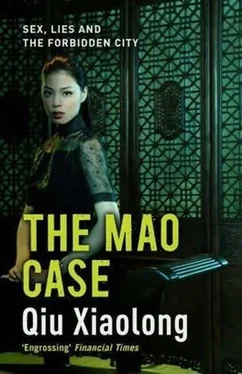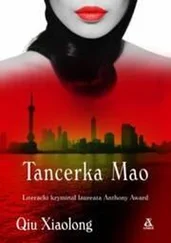So for Mao, the anti-Rightist movement, the Three Red Banners, and the Cultural Revolution – all those political movements that had cost millions and millions of Chinese people’s lives – might have been nothing more than what was necessary for an emperor to consolidate his power, at least in his imagination within the high walls of the Forbidden City…
Instead of stepping into any of the imperial exhibition rooms, Chen kept walking straight ahead. That morning, he was the only such determined passerby there.
Soon, he walked through the museum’s back gate, from which he then glimpsed the tip of the White Pagoda in the North Sea Park.
FANGSHAN RESTAURANT, WHICH CHEN had chosen for the lunch meeting with Diao, was in the North Sea Park, originally an outside imperial garden attached to the Forbidden City, celebrated for its imperial history.
The restaurant choice was also made for a personal reason. During his college years, Chen had talked to Ling about having lunch there. They had never done so, as it had been far beyond his means.
There was still about half an hour before the appointment time. So he took a leisurely walk along the lake. In spite of the park’s name, there was no sea, only a man-made lake, which was exaggerated for the sake of the emperor. Still, it was a fantastic park in the center of the city, adjacent to the Beijing Library, where Ling had once worked, and with the silhouette of the White Pagoda shimmering behind.
He made his way toward a small bridge that he remembered from years before. Cutting across a corner, he saw an arts-and-crafts boutique store embosomed in the summer foliage. He stepped in, but things were too expensive inside. In the evening, he might have some time for a visit to Xidan Department Store to choose a present.
Then the bridge came into view. There, a young girl stood leaning against the railing, gazing out to the verdant mountains in the distance, a pigeon whistle buzzing in the air. He was overwhelmed with a sense of déjà vu. The heart-breaking spring ripple / still so green under the bridge, / the ripples that reflected her arrival / light-footed, in such beauty / as would shame a wild goose into fleeing.
One afternoon, in his last years of college, Ling had arranged to meet him here with some books he had requested. He was delayed at school, and she must have been waiting for a long time. Hurrying over, he saw her standing on the muddy planks of a little bridge, resting one foot lightly on the railing, scratching her ankle, her face framed by wind-tangled hair. The scene was inexplicably touching: it was as if she was merging into a backdrop of willow catkins, which symbolized ill-fated beauty in Tang-dynasty poetry.
Whether the scene of the willow catkins had foreshadowed their relationship, no one could tell. But it wasn’t time for nostalgia, he told himself, heading back in the direction of the restaurant.
Fangshan presented an ancient-looking front. In a quiet flagstone courtyard, a waitress dressed like a Qing palace lady came up and led him to a private room. What struck him first was the ubiquitous yellow color – the color exclusively for the royal family. Against the yellow-painted walls, the table was set up with an apricot-colored tablecloth and gilt chopsticks, and behind him, an old cabinet elaborately embossed with golden dragons. Sitting by the window, he opened the briefcase and took out the information he had about Diao.
Diao was a newcomer on the literary scene – a middle school teacher up until his retirement, with no publications whatsoever to his credit until he suddenly produced his bestseller, Cloud and Rain in Shanghai. That practically ruled out the possibility that Diao would recognize Chen. The former wasn’t a member of the Writers’ Association, and they couldn’t have met before. The chief inspector should be able to play a role similar to the one he had at Xie Mansion.
People attributed the success of Cloud and Rain in Shanghai to its subject matter, but nonetheless it bespoke of the author’s ingenuity. Chen had read the book, impressed by the subtle balance between the stated and the unstated in the text.
At two or three minutes before one, the waitress led in a gray-haired man of medium build, with a deeply furrowed forehead and beady eyes, wearing a black T-shirt, white pants, and shiny dress shoes.
“You must be Mr. Diao,” Chen said, rising from the table. “Yes, I’m Diao.”
“Oh, it’s a great honor to meet you. I’m Chen. Your book, Cloud and Rain in Shanghai, is such a big bestseller.”
“Thank you for your invitation to lunch. This is an imperial restaurant, really expensive, and I’ve only heard about it before.”
“I was a student in Beijing years ago, and I would dream of coming here. So it’s for the sake of nostalgia as well.”
“That’s not a bad reason,” Diao said with a grin, showing cigarette-stained teeth. “Don’t you remember a line by our great leader Chairman Mao? ‘Six hundred million people are all Sun and Yao, great emperors.’ Poetic hyperbole, to be sure, but Mao’s right about one thing. People are interested in being emperors, or being like emperors.”
“You are absolutely right.”
“It explains the popularity of the restaurant. People come not only for the food, but for the imperial association too. For a short moment, they can imagine themselves being an emperor.”
That might have also been true for Shang – she might have enjoyed imagining herself as an emperor’s woman. Chen raised his cup, making no comment.
The waitress approached and offered them a small platter of dainty, golden ououtou, steamed buns usually made of maize. The ones Chen remembered from his college years had been somber in color, hard to swallow. These looked very different.
“It’s made from a special green bean,” the waitress said, reading his surprise. “Super delicious. The Empress Dowager’s favorite.”
“Great, we’ll try that,” Chen said. “Recommend some other specials to us.”
“For the private room, there is a minimum charge of one thousand yuan. You have to spend at least that amount anyway. So let me recommend an exquisite meal of light delicacies. All small dishes, about twenty of them – the Empress Dowager’s way. That was the minimum for one meal for her too. To begin with, the live fish from the Central South Sea steamed with tender ginger and green onion.”
“That’s good,” Chen said. No one would miss the association between the Forbidden City and Central South Sea.
“What else?” Diao asked for the first time.
“The roast Beijing duck, of course.”
“Duck from the palace?”
“Genuine Beijing ducks. Specially fed, six to eight months old. Most restaurants now cook with an electric oven. We stick to the traditional wood-burning oven, and we use not just any firewood, but a special pine wood so the flavor penetrates deep into the texture of the meat. It was unique practice used only for the emperors,” she said with pride in her voice. “Oh, our chefs follow the tradition of blowing up the duck with their mouths and sewing up its ass before placing it into the oven.”
“Wow, so much to learn about a duck,” Diao exclaimed.
“We offer the celebrated five ways of eating a duck: crisp duck skin slices wrapped in pancake, duck meat slices fried with green garlic, duck feet immersed in wine, duck gizzard stir-fried with green vegetables, and duck soup, but the soup takes about two hours before it turns creamy white.”
“That’s fine. I mean the soup,” Chen said. “Take your time with the soup. Bring up whatever specials you think are the restaurant’s best. Today, it is for a great writer.”
“You overwhelm me with your generosity,” Diao said.
Читать дальше












